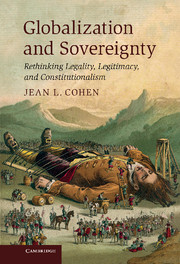Book contents
- Frontmatter
- Contents
- Preface
- Introduction
- 1 Sovereignty in the context of globalization: a constitutional pluralist approach
- 2 Constitutionalism and political form: rethinking federation
- 3 International human rights, sovereignty, and global governance: toward a new political conception
- 4 Sovereignty and human rights in “post-conflict” constitution-making: toward a jus post bellum for “interim occupations”
- 5 Security Council activism in the “war on terror”: legality and legitimacy reconsidered
- Conclusion
- Notes
- Bibliography
- Index
1 - Sovereignty in the context of globalization: a constitutional pluralist approach
Published online by Cambridge University Press: 05 August 2012
- Frontmatter
- Contents
- Preface
- Introduction
- 1 Sovereignty in the context of globalization: a constitutional pluralist approach
- 2 Constitutionalism and political form: rethinking federation
- 3 International human rights, sovereignty, and global governance: toward a new political conception
- 4 Sovereignty and human rights in “post-conflict” constitution-making: toward a jus post bellum for “interim occupations”
- 5 Security Council activism in the “war on terror”: legality and legitimacy reconsidered
- Conclusion
- Notes
- Bibliography
- Index
Summary
It is an understatement to say that the contemporary international society of states is deeply divided. Despite the happy consciousness of those who believed in the worldwide triumph of liberal democracy in the early 1990s, the legitimating principles for domestic polities around the globe remain diverse. True, the sovereign state form was globalized in the second half of the twentieth century. Yet we still inhabit a global pluri-verse of 192 sovereign states whose political cultures, organizational principles, and conceptions of justice and legitimacy are diverse and at times in conflict with one another.
Superimposed on this segmentally differentiated, pluralistic international society of sovereign states are the legal and political regimes of the functionally differentiated global subsystems of world society, whose institutional structures, decision-making bodies, and binding rules have acquired impressive autonomy with respect to their member states and one another. These “regimes” or “subsystems,” of which the global political system is one, engage in new forms of global governance and law-making that reach beyond and penetrate within states. Individuals are increasingly ascribed rights and responsibilities under globalizing international law. This expanding individuation of international law seems to mark an important difference from the pre-World War Two international legal system and from stereotypes of “Westphalian” sovereignty. Although states remain the main subjects that make international law, they no longer have the monopoly of the production of that law. Indeed the international organizations they have spawned seem to be transforming into global governance institutions, which, like the sorcerer's apprentice, tend to invert the principal–agent relationship extant at the time of their creation. These GGIs now regulate states and individuals, including the treatment by states of their own citizens, in the name of the “international community,” importantly redefining (some would say abolishing) state sovereignty. As a result, states are bound by rules and regulations that make the old images of international society and the consent-based production of international law appear anachronistic.
- Type
- Chapter
- Information
- Globalization and SovereigntyRethinking Legality, Legitimacy, and Constitutionalism, pp. 21 - 79Publisher: Cambridge University PressPrint publication year: 2012
- 1
- Cited by



